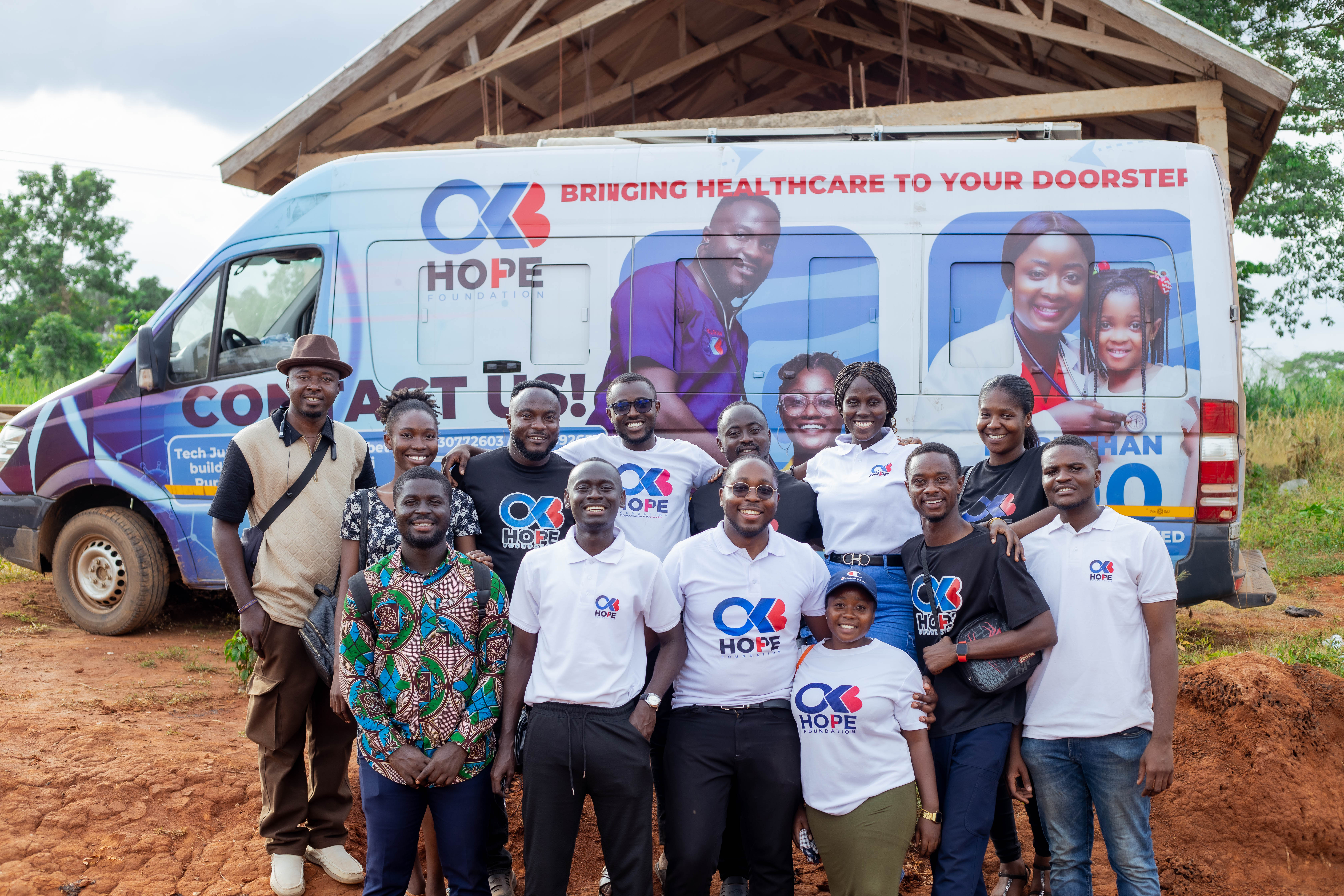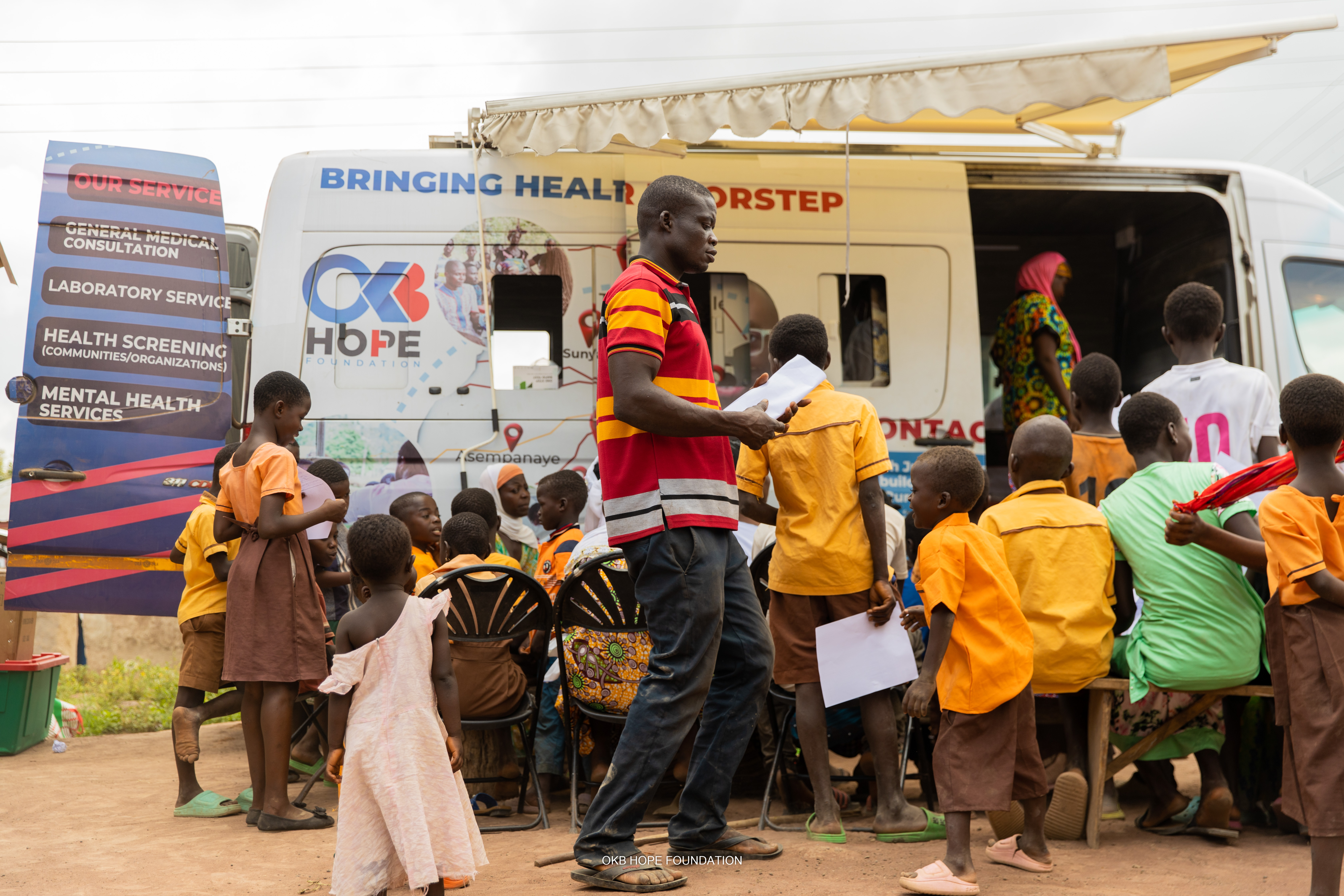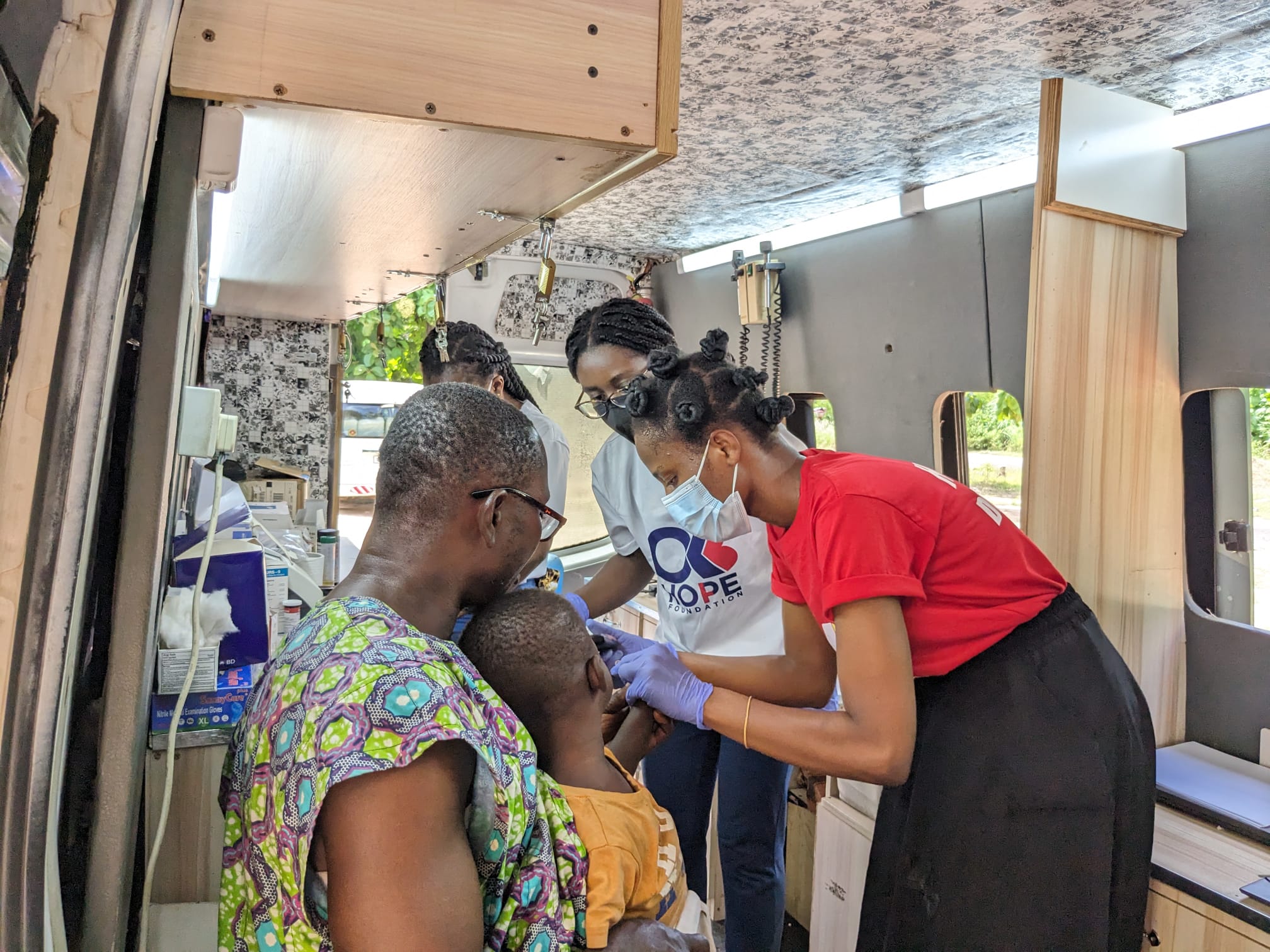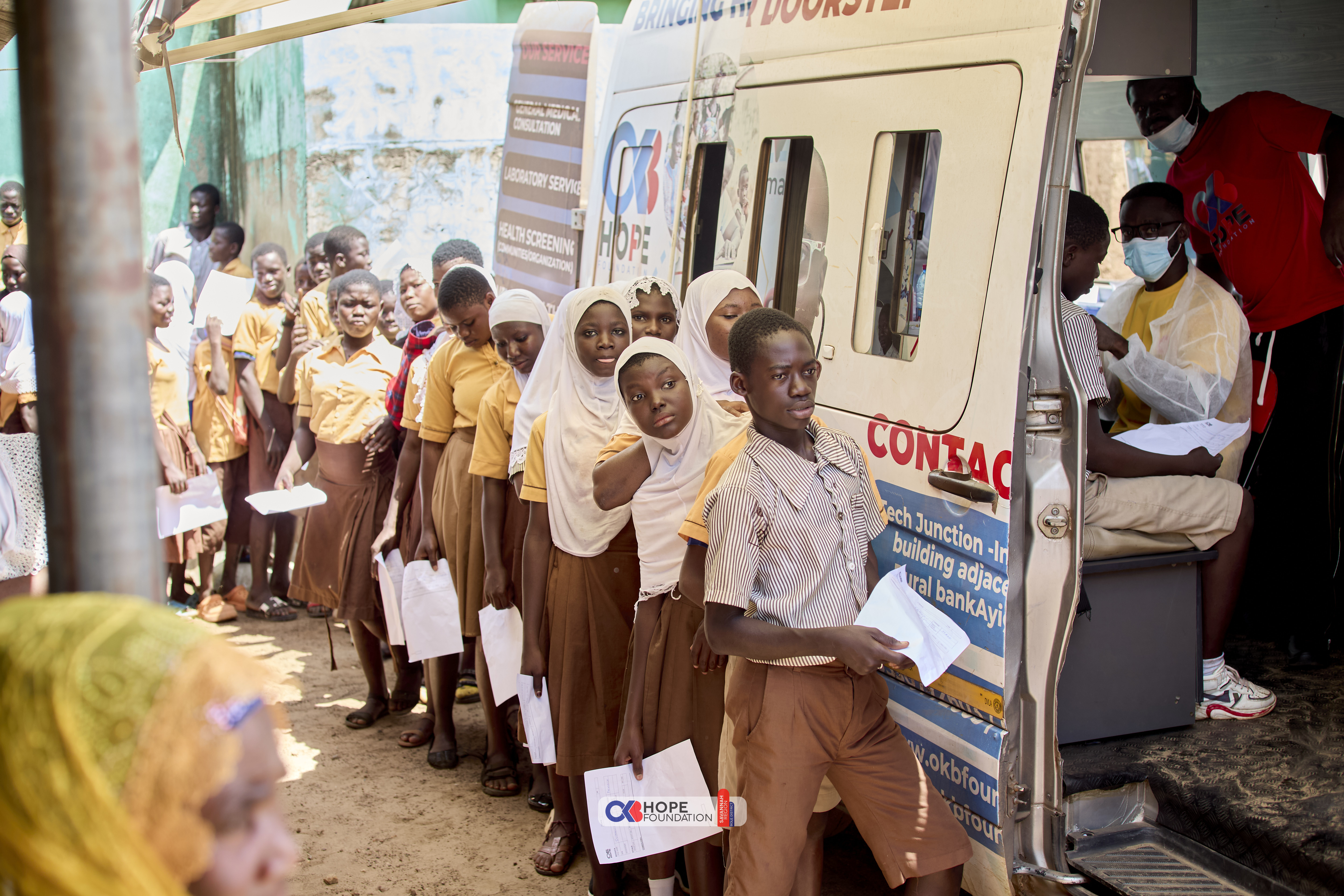When Global Citizen announced that Osei Boatenghad won the 2025 Global Citizen Waislitz Grand Prize, it recognized an effort that grew from personal loss into a national model of health care delivery. As founder of the OKB Hope Foundation, Boateng leads mobile health initiatives and school-based wellness programs that reach communities with limited access to care.
“I was born and raised in Ghana. I grew up in a community where access to health care was a challenge,” he said. “I grew up seeing a lot of my community members struggling to get access to health care and for those who were able to get to the care, it wasn’t always guaranteed that once they got to the health facility there was a doctor or the medication that they needed available.”
A Mission Shaped by Family
Boateng’s grandmother played a central role in his upbringing. When she became seriously ill, the family could not find a provider in time.
“We all tried our best to get her to the nearest health care facility and we didn’t get a doctor or a health care provider in time to take care of her; by the time we got one it was too late,” he recalled.
“When this happened and we were not able to get a health care provider and eventually lost her that was when I said to myself: ‘when I become of age, this is what I want my life’s purpose to be, to ensure that people in the rural and underserved communities don’t go through the same thing that my family and I went through.’”
From Cornell to Community Outreach
After his family moved to the United States in 2014, Boateng began pre-medical studies at Raritan Valley Community College and continued at Cornell University. During a physiology course, he realized how different Ghana’s reality was from what he was studying.
“They were talking about different diseases — especially cardiovascular diseases [like] hypertension and diabetes — and how these have silent symptoms. If people don’t know about them they can die so you need to be at the health care facility to get your pressure checked… For me it was like wait, we don’t even have blood pressure monitors… it’s a struggle to go to [a] health care facility let alone get your blood pressure checked.”
In December 2017, Boateng organized his first outreach mission. “We did the screening and we saw a lot of people. One thing that stood out was that a lot of people had high blood pressures that they didn’t even know of,” he said. He went on to explain that a woman who was checked at the screening had a blood pressure over 200 and was sent straight to emergency care. “If the woman hadn’t come around this time we wouldn’t even know what would have happened afterwards.”
Mobile Health Vans
Through these experiences, Boateng recognized that many people delay seeking care because of the economic trade-offs involved.
“Most of them are in the informal sector. Whatever they sell in the market determines the money that they earn at the end of the day, and that determines the food that they can put on the table,” he explained. “So it becomes a very difficult decision for them to leave their place of work to go to the hospital and hope that there is someone who is going to take care of them.”
To close this gap, OKB Hope Foundation launched mobile health vans that bring consultations, diagnostic testing, and medication directly to communities. Before visits, the team works with district health offices and surveys residents. “On average we see 150 to 200 people daily. Some we’ve done… upwards of 500 in a day,” Boateng said.
The foundation also began to address mental health after hearing concerns about livelihoods, crops, and uncertainty.
“It wasn’t only about physical health. There was a mental health component to it,” Boateng explained. The team launched symposiums in schools and then introduced wellness clubs to provide regular support. “Now we are also trying to leverage technology like AI to be able to fill the gap created by the shortage of mental health care providers by being an assistant 24/7 for these students.”
Stories from the Field
In 2022, the team traveled to a remote community in Ghana where most children tested positive for malaria.
“We were just wondering, wait, what’s going on in this particular community? We asked the community members, if a woman is pregnant what would you do? They said that if they know she’s going to deliver, they’d just take a motorcycle and take her to the hospital or the nearest health care center sometimes days or even weeks before she actually delivers… because if anything happens at a community level the likelihood of her survival is low.”
On another visit, the team identified a child with kidney disease, transported her to the city, and supported treatment before returning her home. “Always being able to give one person a second chance to life is really priceless,” Boateng reflected.
However, the demand often exceeds what the team can provide. "I remember one day we planned for about 200 to 250 people, but instead, 500 showed up. We had no choice but to prioritize those who were really sick. Moments like that remind us why we believe so strongly that knowledge is power. Even if we can’t treat everyone, when we educate and give people the knowledge, they can carry it with them and use it to make better decisions for their health."
The foundation currently manages operations with what Boateng calls: “one and a half vans” — one aging and one active van. A small permanent staff is supported by volunteers who relish the challenge of treating unpredictable cases with minimal equipment.
But winning the Global Citizen Waislitz Grand Prize provides resources to expand. Boateng’s first goal is to secure another van. He also plans to partner with local institutions.
“In every community we visited, even though there wasn’t a health care facility, there was always a church. We saw an opportunity: what if the church could become more than just a place of worship, but also a hub for health? Imagine a centralized station right inside the church where, after Sunday service, people could stop by, check their blood pressure, and take charge of their health.”
The foundation has also applied for national health insurance accreditation so that services can be reimbursed. “That is the plan for the government to reimburse for the service that we are delivering for the rural and underserved communities.”
Looking Ahead
Boateng describes his long-term goal as shifting health care culture.
“One of my visions is to be able to change the culture of reactive health care to a more proactive one. Right now, people are not seeking health care until that’s their last option. The goal is how do I now get people to really think about care before they get to that point.”
He is realistic about the timeline. “It might not happen in my generation. Because you know it takes a new generation to come up with this mindset, but I think what I would love to be remembered for is at least being able to play a role in changing the mindset of people from being reactive when it comes to health care to more of a proactive one.”
From losing his grandmother in rural Ghana to leading a foundation that has reached more than 100 communities and served 15,000 lives, Boateng’s journey shows how personal experience can inform sustainable solutions. With the support of the Global Citizen Waislitz Grand Prize, the OKB Hope Foundation is positioned to expand mobile services, strengthen mental health initiatives, and build a framework that allows people to access care earlier and more effectively.



